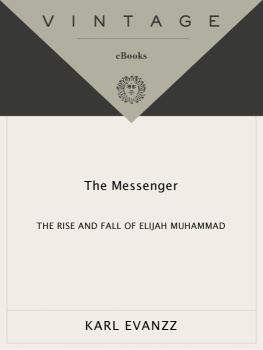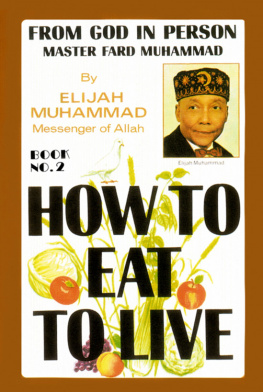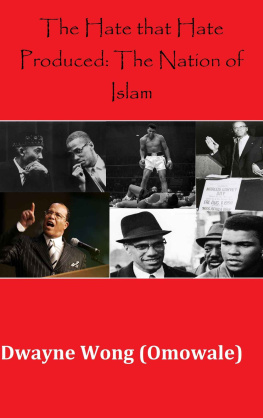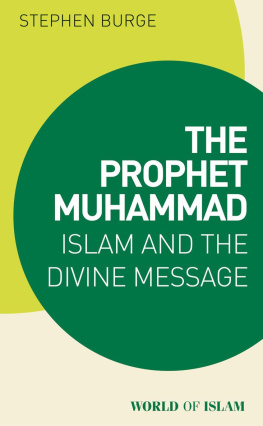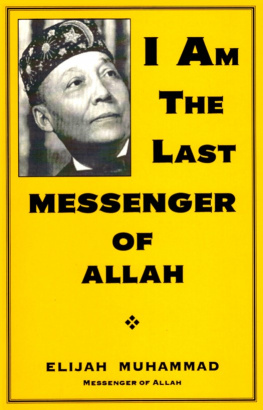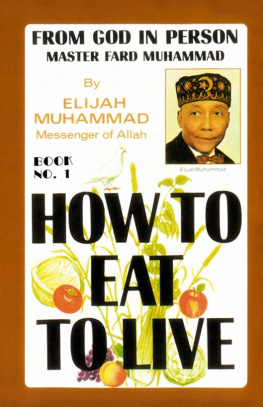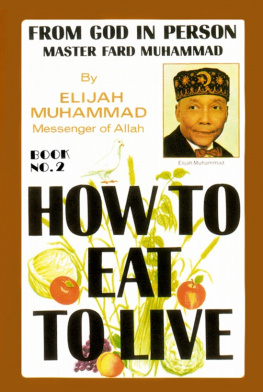ACCLAIM FOR Karl Evanzzs
THE MESSENGER
Evanzz has a nose for scoops.
Time
Evanzz expertly charts Muhammads course.
The Star-Ledger
Karl Evanzz is both a meticulous historian and an effective chronicler. For anyone seeking to understand the history of the Black Muslim movement and its place in America during the twentieth century, this book is essential.
David Maraniss
There is nothing of the dull history tome about Evanzzs narrative: occasional flashes of irony add to this fascinating story of the self-described prophet of Islam.
The Republican
A fascinating, long overdue study of one of the most intriguing personalities of the twentieth century One of the most complete accounts to date of the final, bitter confrontation between Muhammad and his chief disciple, Malcolm X.
Publishers Weekly
Evanzz excels at evoking the historical context of his subject, offering a masterful account of the rise and fall of the Nation of Islam and its impact on African Americans. An important, if disheartening, book.
Kirkus Reviews
A convincing expos that also offers an interesting account of the souring relationship between Muhammad and his great disciple, Malcolm X.
Library Journal
Karl Evanzz
THE MESSENGER
Karl Evanzz is an on-line editor at The Washington Post . He has appeared on The Oprah Winfrey Show, MSNBC , and Tony Browns Black Journal as an authority on the Nation of Islam, Malcolm X, and Louis Farrakhan. He is the author of The Judas Factor: The Plot to Kill Malcolm X . He lives in suburban Washington, D.C.
ALSO BY Karl Evanzz The Judas Factor: The Plot to Kill Malcolm X

FIRST VINTAGE EDITION , J ANUARY 2001
Copyright 1999 by Karl Evanzz
All rights reserved under International and Pan-American Copyright Conventions. Published in the United States by Vintage Books, a division of Random House, Inc., New York, and simultaneously in Canada by Random House of Canada Limited, Toronto. Originally published in the United States by Pantheon Books, a division of Random House, Inc., New York, in 1999.
Vintage and colophon are registered trademarks of Random House, Inc.
The Library of Congress has cataloged the
Pantheon Edition as follows:
The messenger: the rise and fall of Elijah Muhammad / Karl Evanzz.
p. cm.
eISBN: 978-0-307-80520-1
1. Elijah Muhammad, 18971975. 2. Black MuslimsBiography. 3. Afro-AmericansBiography. I. Title.
BP223.Z8E434 1999
297.8 7 092DC21
[b] 99-11826
www.vintagebooks.com
v3.1
In
loving memory
to my mother; and
to Dad; to my immediate
and extended family, expressly
Donald Brown, one of Americas most
gifted musicians and prolific composers; and
to Malcolm Shabazz, with faith, love, and prayer.
CONTENTS
PREFACE
Americas long and divisive experiment with school integration may be quietly coming to an end. Although both black and white Americans strongly support the ideal of integration, the persistence of de facto residential segregation has made integration difficult to obtain by anything short of extraordinary measures.
Book Notes , Harvard Law Review (1996)
A generation ago, 80 percent of Blacks went to church. Today that figure is 40 percent.
Christianity Today, March 4, 1996
At a time when many denominations are seeing a decline in membership, Islam is said to be the fastest-growing religion in the United States.
Congressional Quarterly Researcher, April 30, 1993
I f the 1993 bombing of the World Trade Center in New York City had occurred on any day other than February 26, there would not have been speculation about it being the work of the black separatist sect known as the Nation of Islam. Nor would some African Americans have wondered whether the bombing was an elaborate government measure to equate Islam with terrorism, and in that way suppress its growing appeal to blacks, as it had done with Marcus Garvey and Pan-Africanism in the early part of this century.
To most Americans, the Nation of Islam is synonymous with Louis Farrakhan, the controversial minister who, to nearly everyones amazement, inspired up to one million black men to gather in Washington on October 16, 1995, for a day of atonement. While the mass media credited Farrakhan with conceiving the idea of the Million Man March, he had said some months before the march that the initial idea came out of a thirty-two-year-old conversation between himself and a man he habitually refers to as the Honorable Elijah Muhammad.
I was visiting with the Honorable Elijah Muhammad as we watched the 1963 March on Washington, Farrakhan wrote in an article published on the World Wide Web in the fall of 1995. He said he saw too much frivolity, joking, and a picnic atmosphere. He promised Farrakhan that one day the Nation of Islam, which he, Muhammad, headed at the time, would call for its own march on Washington. In calling for the Million Man March, Farrakhan maintained that he was fulfilling another of Muhammads prophecies.
Farrakhan referred to Elijah Muhammad often during his three-hour address that day (the first anniversary of his brother Alvans death), but most young Americans outside the African-American community had no idea whom he was talking about. Foreigners were even more in the dark and were equally nonplussed by Farrakhans allusions to Sufism and esoterica in this, his first nationally televised address. But among African Americans, the name Elijah Muhammad had a ring as familiar as Big Bens to the British and connotations as unique to them as those of the pyramids to the Egyptians. They have always regarded Elijah Muhammad as the primary embodiment of the sect and the single most significant mover in the skyrocketing conversion of African Americans to Islam.
Indeed, most of the estimated four million African Americans who have converted to Islam did so after reading pamphlets and books written by Elijah Muhammad or after visiting one of the hundreds of storefront mosques he opened over a period spanning five decades. That hip-hop artists as dissimilar as Afrika Bambaataa, Brand Nubian, and Public Enemy have recorded rap songs in praise of him is a testament to his enduring influence in Black America. Get back on the right track, a popular hip-hop group urged listeners some years ago, by listening to the word from the Honorable Elijah Muhammad. Today, large colorful posters featuring his likeness dominate dormitory rooms on college campuses across the country, while small, framed black-and-white photographs of him are displayed on nightstands and mantels in the homes of many black senior citizens.
Who, exactly, was Elijah Muhammad?
Asking that is tantamount to quizzing college freshmen on the nature of truth: it will beget answers as varied as the faces in the classroom. To acolytes of Minister Farrakhan of Chicago and Minister Silis Muhammad of Atlanta (the head of a splinter group of the Nation of Islam), Elijah Muhammad was the seal of Gods prophets, the Messiah whose coming was foretold in the Holy Bible and the Holy Quran. Muhammad himself fostered this idea and, for years, tried to convince his family (some of whom had studied Islam at prestigious universities in the United States and in the Middle East) that he, Elijah of Gilead, and the seventh-century prophet Muhammad were one and the same.
For Imam Wallace Muhammad of Chicago, his father Elijah was a proud parent of eight children who brought African Americans back to their old-time religion, as millions of Africans who came here in chains were Muslims. To orthodox Muslims, he was a heretic akin to the founders of the Bahai faith and the Ahmadiyya Movement. All these perceptions, like the tactile experiences of the ten blind men describing the elephant, reflect elements in his persona; any one or group of them fails to capture the complete picture of the man.
Next page
